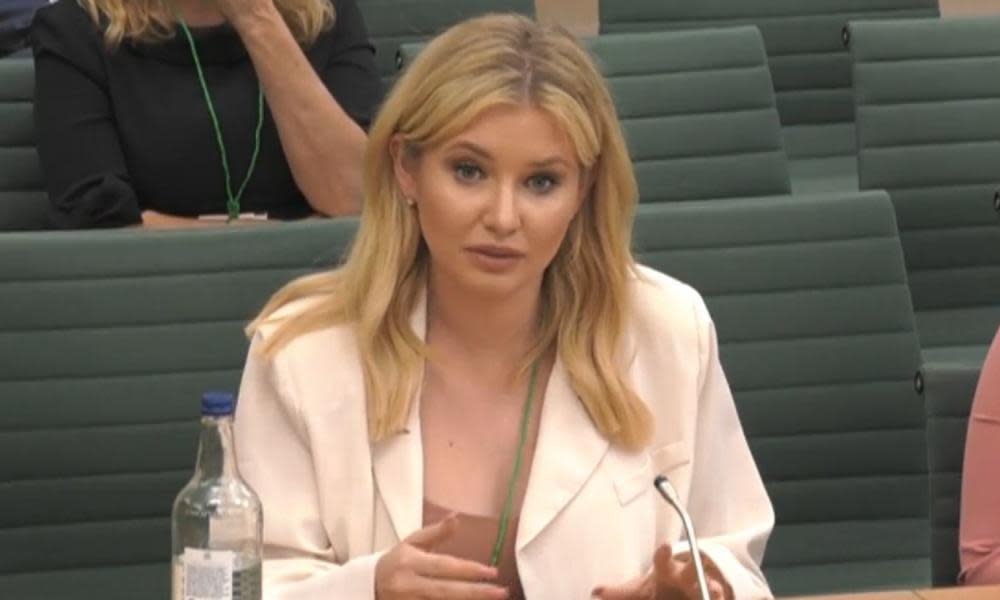Love Island star Amy Hart says she had online death threat from 13-year-old

The former Love Island contestant Amy Hart has said her online abusers are often married people with children or people in jobs such as nursing, and that she received a death threat from a 13-year-old child.
Hart, who was giving evidence to a committee of MPs investigating influencer culture, said she had 3,000 Instagram followers before she appeared on the popular ITV reality programme. When she left, she had 1.1 million. “That was quite life-changing: suddenly going from nobody knowing what you were doing to everybody knowing what you were doing.”
Hart said she would rather lose followers by being open about what she believed in and cared about than being impartial.
“I do get backlash when I talk about things, and I will say the [social media] networks are not supportive enough when it comes to trolling.”
She told MPs that she reported abusive comments and was told they did not breach community guidelines. “You look at this barrage of messages someone has sent me before 7am about how much they hate me, how awful I am, how everyone hates me, how ugly I am … from a fake account as well. You’re telling me that doesn’t break the policy?”
Hart said she sometimes dug deeper into abuse from real accounts and went to Facebook pages. “I was getting trolled by nurses and people that have got husbands and children. I think, ‘Do you go to dinner parties and tell your friends that you’re trolling random 29-year-old girls that you don’t know?’ I just don’t understand it.”
Trolls were often middle-aged women, Hart said, while “some of the most awful messages I’ve had” came from schoolchildren.
Hart said companies such as Instagram should insist on users giving identification information, such as a national insurance number or, if you were under 16, one of your parents’ NI numbers.
“One of my death threats was traced back to a 13-year-old. You think, if that’s them at 13, in their bedroom, what are they going to do when they are 18 and they are out on their own?”
Hart said it was left to her to delete abuse. She also uses a filtering tool to block words such as “fat” or “ugly”.
She said she had lost confidence in social networks dealing with trolling. “I’ve probably stopped reporting them now because I know there is no point,” she said.
Hart was backed by the Scottish National party MP John Nicolson, who said he had been abused on Twitter. He reported it several times “and they responded by saying [the post] did not violate our community standards”.
A previous session of the digital, culture, media and sport (DCMS) select committee heard from the social media influencer Em Sheldon, who said that influencers faced daily online attacks from women whose “sole mission is to ruin our lives”.
Hart’s evidence follows that of the footballer Rio Ferdinand, who last week spoke powerfully at a joint committee of peers and MPs scrutinising a draft online safety bill. He said he had seen members of his family “disintegrate” over the level of online abuse he suffered.
Under the draft proposals, social media companies will have a duty of care to protect users from harmful content, including racist comments, threats and harassment, and could, theoretically, face multibillion-pound fines if they fail to do so.
The DCMS committee is investigating the culture of influencers: people who have the power to alter people’s buying habits and are often paid by brands to do so.
The committee’s remit includes examining the absence of any regulation.
For her part, Hart said being an influencer was too often seen as a bad thing. “It is a form of advertising. There is so much negativity around it as a job … If your child said, ‘I want to work in advertising,’ you would be, ‘Oh, great.’ People need to realise it is a real job.”

 Yahoo News
Yahoo News 
